Having trouble getting your kids excited for the camping trip? You’re not alone.
In the current days of constant technology, screens everywhere, and repetitive engagement in social media and videos, it’s like pulling teeth to drag your kids away and get them to enjoy the real world.
Fortunately, that’s where we come in to help. It’s a harder task to tackle than setting up the campsite, but together, we’re going to come up with camping activities for kids to get them involved in the experience and ask them to go on another trip as soon as possible.
Exciting Camping Activities for Kids
Some of these tasks are going to require some forward thinking, but with a little ingenuity and adapting these ideas to your unique camping style, you’ll create unforgettable experiences that will last until they’re teaching their own children the same values one day.
1. Set the Right Tone

Camping with kids is far more hands-on than their chores at home, and you definitely have to prepare them for it beforehand.
Camping involves more than just setting up camp and sleeping outdoors; it also involves catching fish, gathering firewood, setting up tents, and performing various tasks. Making a laundry list of tasks to complete is the biggest mistake you can make.
It’s going to feel like a punishment. Set the tone by talking about how excited you are to get out on the boat and catch some fish to set up the perfect campfire.
Let them know how excited you are to be showing them all of this stuff, and it will show them that it’s a fun time to relax and bond, rather than being taken away from their normal everyday life as some form of punishment.
Children enjoy their routines and hate change, which is why they’re often grouchy when you finally get in the car on the day of the trip.
We’re aiming for fun and memorable moments here, but understand that they may not find everything fun. Promise them (and live up to it) that if they don’t find an activity fun, then they have alternatives.
Give them a short list of options, and weave responsibilities in between. Starting off with something fun will create a happier vibe throughout the rest of the trip, and they won’t mind collecting firewood or helping to prepare food as much.
2. Teach Them to Fish
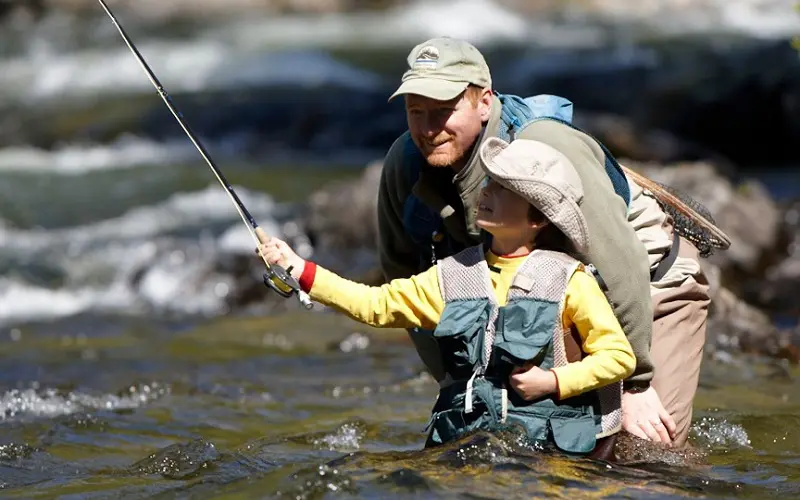
Speaking of food, it’s time to bust out the bait and tackle box. No matter when you learn how to fish, this is going to be the time they learn.
If you’re feeling a bit rusty, introduce this activity later, after you’ve had a moment to reassess yourself with your fishing gear. Maintaining a fun atmosphere is the trick to fishing.
If you’ve banned devices for the trip, you’ll have to maintain a conversation while you’re waiting for something to bite, while also keeping things fun and interesting.
One tip is to put your fishing trip on a timer. It lets them know that this isn’t an all-day affair, which is particularly helpful if there’s something else that they have their heart set on.
It also gives you a timeframe to say to yourself, “Okay, I have thirty minutes to teach them what I know and thirty minutes to put it into action; then we’re coming back to the campsite.”
It helps to eliminate awkward silences and shows a bit of appreciation for the sport. The trick is, if you’re a minimalist camper, you could be relying on that fish for dinner tonight.
If you’re still waiting for a bite after the designated fishing time, take your child back to the campsite and leave them with an adult while you return to catch dinner.
During your absence, they will understand the amount of work involved and may choose to join you on your next fishing trip for an extended period.
3. Bring the Mountain Bikes
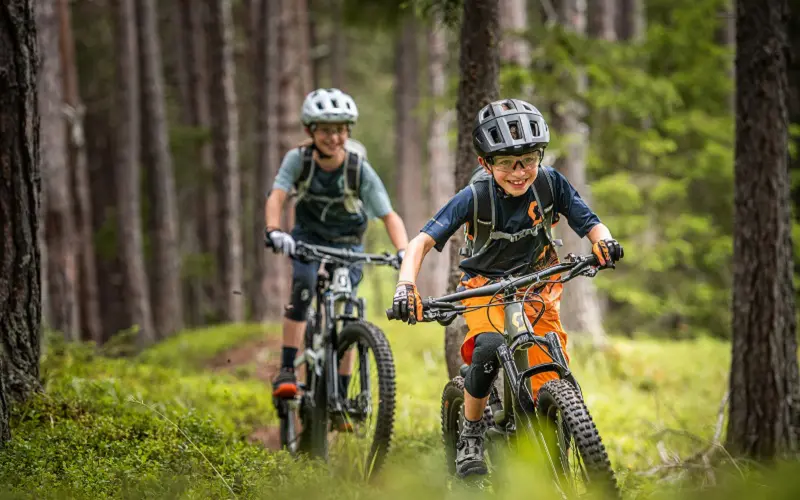
This is the perfect opportunity for some high-octane fun.
Mountain biking trails run rampant across numerous campsites, and some even have wide stretches of paved roads for you to cycle on.
Mountain biking can turn into a race; it can simply be a leisurely activity to fill in the hours; and it helps to burn their energy reserve for when bedtime comes.
We’ve covered the best campsites in every state, and nine times out of ten, there are miles and miles of cycling trails to explore.
Even the smaller campsites in the Midwest will still have a manageable six miles to traverse.
This is a family activity, but if they’re old enough and want to have a bit of time to themselves, they can also go out for a leisurely ride by themselves.
4. Bring a Battery Operated Television
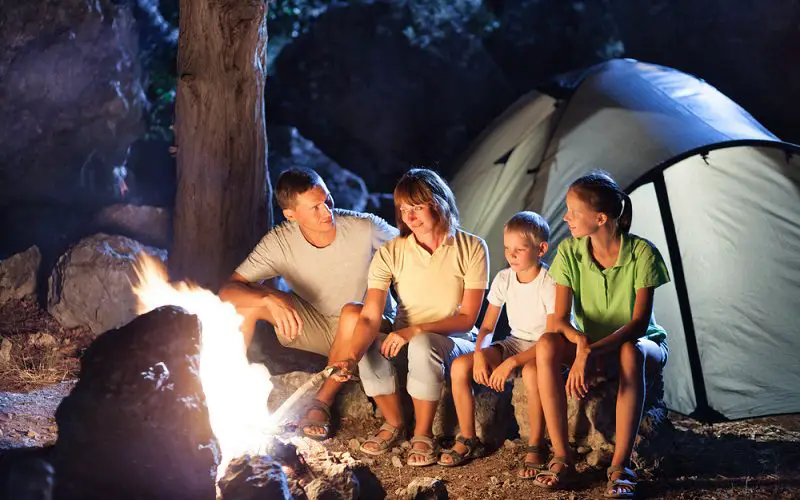
These obviously aren’t the same as back in the day, but they still make battery-operated televisions to bring camping with you.
One of the most classic campfire activities that comes to mind right off the rip is ghost storytelling.
The problem with this is that people frequently portray it as boring and don’t react to it the same way we did as children.
Get a television that includes a DVD drive, and bring along a terrifying movie for the ride. There’s nothing more terrifying than immersing yourself in the darkness and woods while watching a horror film.
The tween and teenager groups are the target audience for this activity, but even those ages are susceptible to fear.
This is a great thing to have in your back pocket for the final night, so they can leave the spooky feelings on the campsite and get back to normal when they get home.
5. Teach Them How to Light a Campfire
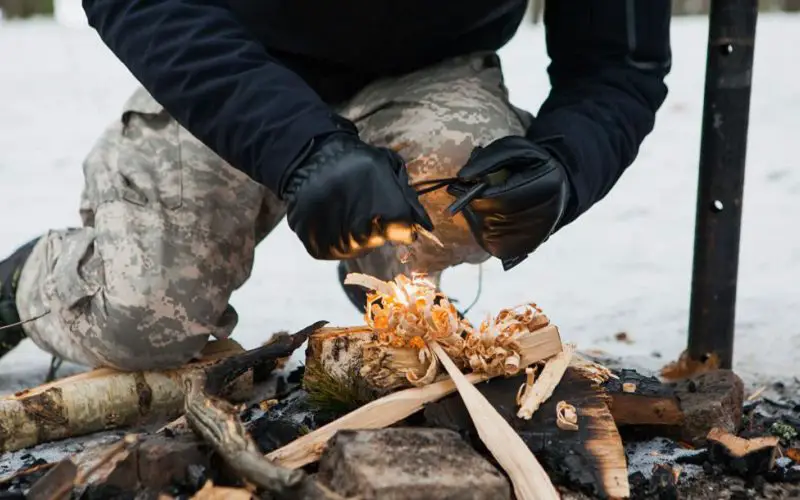
This is the ultimate teaching moment. You can’t do much without a campfire, and there are a hundred different ways to build one.
You’ll be teaching them a hands-on skill that they’ll use on every single camping trip for the rest of their lives, and they won’t be able to help but think of that excellent time the two of you had.
This is also a great time to teach them a bit about safety, including spacing your campfire away from your belongings, keeping it ventilated, and building a proper fire pit.
This activity is as involved as you want it to be. You can collect kindling and stones to build a parameter around the pit, making this a great experience.
Kids are undoubtedly going to get excited at the prospect of actually lighting the fire, so you’re engaging their natural curiosity in a safe space where you can disclose all the safety procedures for handling a live fire.
6. Flashlight Tag
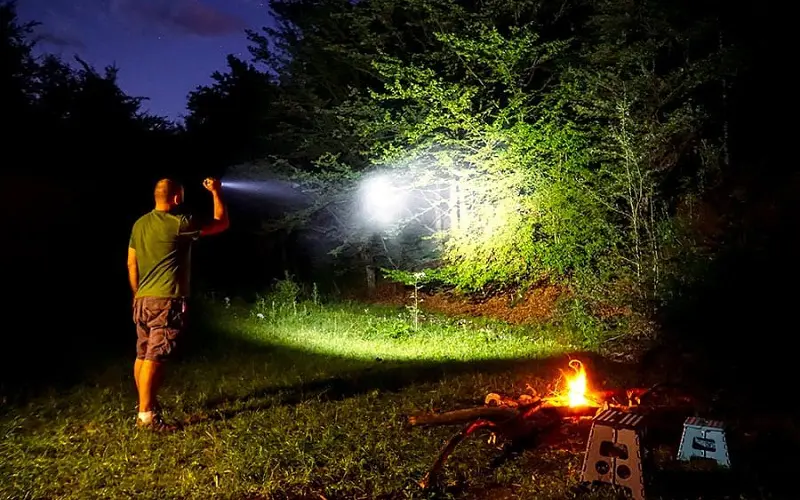
A flashlight tag is another extremely engaging activity that’s sure to leave them exhausted and ready for bed.
This is something that most of us did as kids, whether it was on the campsite or not, so it’s bound to bring back some childhood nostalgia that you can use to have a fun time with your kids.
The great thing about this activity is that it involves and engages the entire family, so you can get in some quality bonding time while ensuring that they have the time of their lives as well.
Establishing a safe zone before you begin is crucial. Unless you’ve got a few Tiki Torches or lanterns around, it’s going to be pretty dark, and you want to ensure that everyone stays in the safe zone to avoid getting lost.
This also keeps the rules of engagement fairly strict, so you can’t have that one kid who walks a hundred feet into the woods with his flashlight off and ruins the game for the rest of them.
Children can become competitive and emotional, so it’s important to review the guidelines before beginning to ensure maximum enjoyment.
7. Teach Them Outdoor Cooking
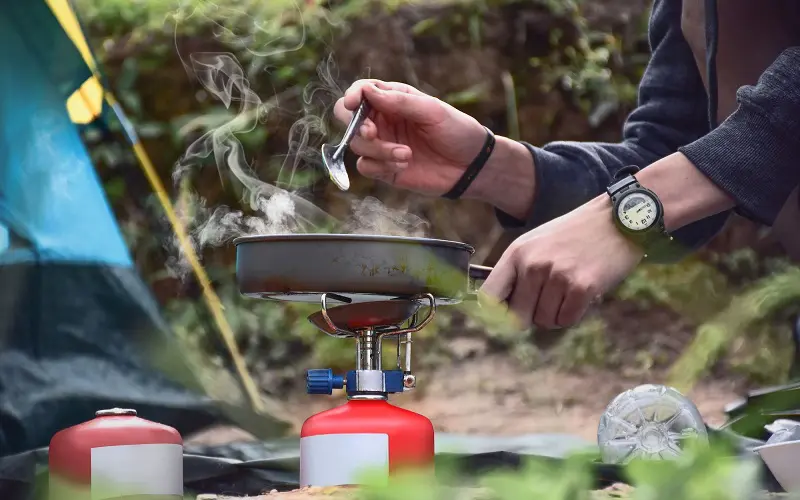
Outdoor cooking is an art form in and of itself, taking away the four walls of your standard kitchen setup.
Not only is it a teaching moment to discuss survival-based cooking, but it also aims to be an enjoyable experience. It’s a teaching moment to talk about survival-based cooking, but it’s also intended to be a fun experience.
Teach your kids how to deal without a traditional stove (or a microwave, for that matter) by bringing out a charcoal grill or a propane grill and serving up excellent food on that.
In the past, we’ve compiled a list of outdoor grilling tips and recipes, and we’ve learned a few things when you’re teaching your son or daughter how to properly cook outdoors.
Stick to simple recipes, such as kebabs, stews, or cooking fish in a frying pan. You want to stick with something simple so that they feel accomplished, but also so that the meal doesn’t come out poorly.
No kid is going to want to have another go at campfire cooking if the dish they made was complicated and came out bad.
8. Scavenger Hunt (With Rewards)
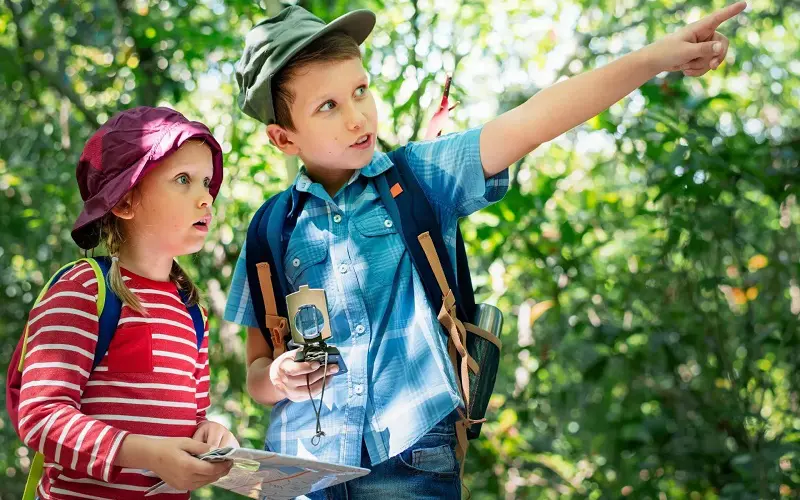
We’re not going to pretend that every waking minute that we’re camping with our children is an explosively fun time.
Sometimes, you just want to kick back with your friends or wife for a little bit, which is the perfect time to introduce this next activity for your little ones.
Create a list, and send them on a scavenger hunt for a little while. Here’s the thing: scavenger hunts aren’t inherently interesting beyond the first ten minutes, which is why offering a reward will amp up the enthusiasm.
If you have more than one child, offer a reward for completing the list, but don’t make it into a race. This way, none of the kids will feel slighted, and they’ll all get to enjoy their prizes at the same time.
9. Water Sports
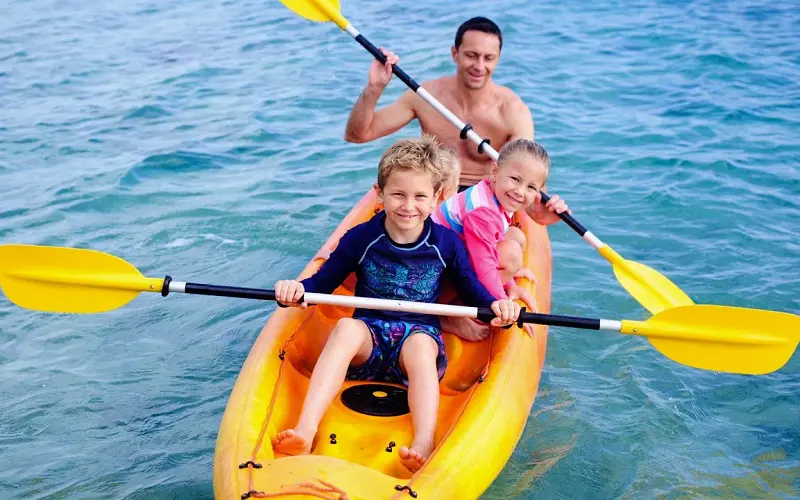
Lakeside camping spots are the things dreams are made of. There’s a reason that every movie about a camping trip has a lake in it.
If there’s any body of water nearby, whether it’s a lake, pond, or river, use it to your advantage. Bring along a canoe or a kayak, or find a spot that has a jet ski rental office to really rev up the fun.
If you’re bringing your own boating equipment, carefully look over the specific campsite rules and regulations for wherever you’re going. Some may require permits, licensing, or just some form of prior clearance.
If the information is scarce or difficult to find (which tends to happen a lot with these websites that aren’t maintained well), pick up the phone and call in with your questions.
Just be sure to write down who you spoke with and when just in the event of any issues when you arrive at the campsite. One fun idea is to make a camp-wide relay race where you combine some of the activities we’ve listed here.
Have it start out on a kayak race to land, then hop on the mountain bikes and make it back to the campsite. This not only keeps them active but works up an appetite for the fish you caught earlier.
If you’re feeling super creative, you can set up a banner for them to break through when they get back to camp and use something like a tactical flashlight as a passing baton if your party is big and includes a lot of kids.
Wrap-Up
You’re about to create a series of memorable moments that they will always reflect on for the rest of their lives and influence how they teach their children to have fun while camping.
You’re not just looking up activities; you’re building an archive of memories.
You must equip yourself with the appropriate equipment to carry out everything correctly and guarantee a flawlessly enjoyable experience.